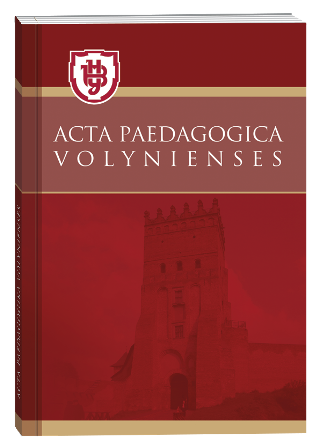THE USE OF GAMES IN THE PROCESS OF STUDYING LITERATURE FOR CHILDREN OF PRIMARY SCHOOL AGE
DOI:
https://doi.org/10.32782/apv/2022.3.6Keywords:
game, children’s game, game activity, literary development of students.Abstract
The article examines the problem of using games in the process of studying literature for children of primary school age. Inadequate development of the problem, its importance for improving the educational process of the new Ukrainian school and meeting the requirements of modern society led to the study of the theoretical and practical aspects of the problem of using the game in the lessons of literary reading, the state of this problem in school practice. Research and publications on teaching literature are analyzed, the purpose of the research is defined, and a number of questions devoted to the coverage of the state of research of the problem in modern scientific literature are outlined. The correspondence of the raised problem to the modern requirements of education, its significance for the literary development of students, as well as insufficient processing of the issue in theoretical and practical aspects determined the relevance of the topic. The following research methods were used in the study: study and critical interpretation of works on literary studies, pedagogy, methods of teaching Ukrainian literature, analysis of professional and school educational publications to determine the theoretical basis of the problem under study. One of the effective means of literary development of students is the use of games, because with proper planning and clear organization, the game in the lesson of literary reading can activate the educational process, create a positive emotional atmosphere, and strengthen most traditional methods of learning. The close connection of the game with art and artistic creativity, the presence of a game aspect in literature, in particular, the manifestation of the game in the works of writers who entered the reading circle of elementary school students. So, the game at a younger age has an important educational value, namely: it educates moral and volitional feelings, teaches discipline; promotes mental development.
References
Газман О. С. Проблема формирования личности школьника в игре / Педагогика и психология игры. Н. : НГПИ, 1985. С. 14–27.
Гончаренко С. Український педагогічний словник. К. : Либідь, 1997. 528 с.
Петровська Т. Система роботи над образними засобами художнього твору на уроках літературного читання. Початкова школа. 2013. № 4. С. 5–7
Сухомлинський В. О. Вибрані твори в п’яти томах. К. : Рад. школа, 1987. Т. 3. 670 с.
Чекіна В. І. Дидактичні ігри на уроках української мови. Початкове навчання та виховання. 2014. № 1–2. С. 64–67.
Чеверда Т. Б. Застосування дидактичних ігор на уроках зарубіжної літератури. Зарубіжна література в навчальних закладах. 2001. № 4. С. 6–10.






